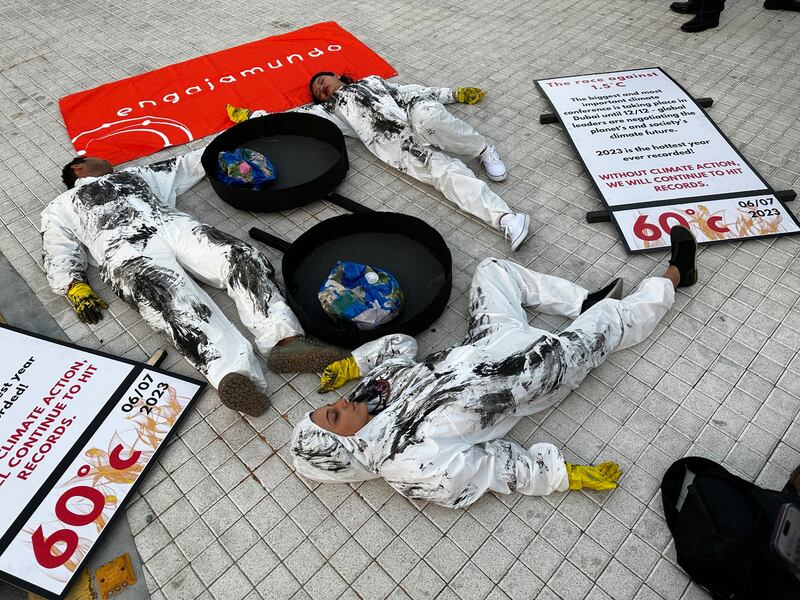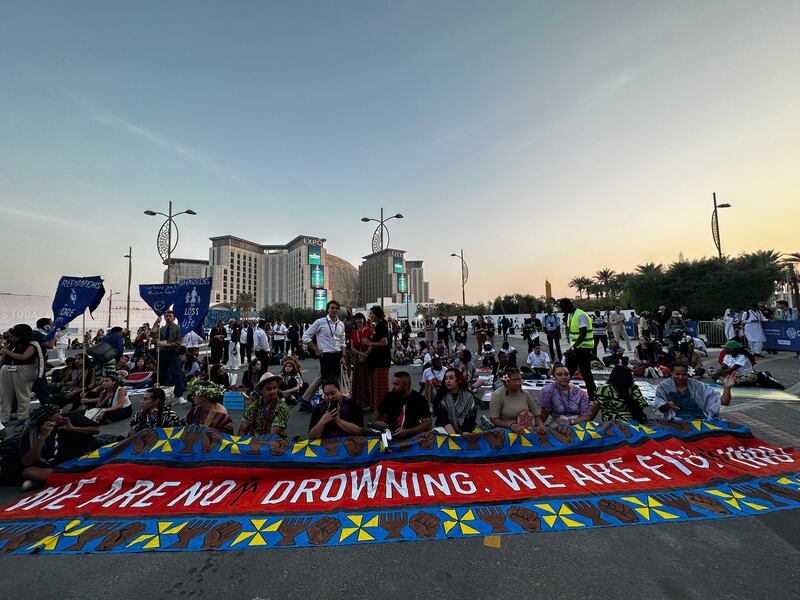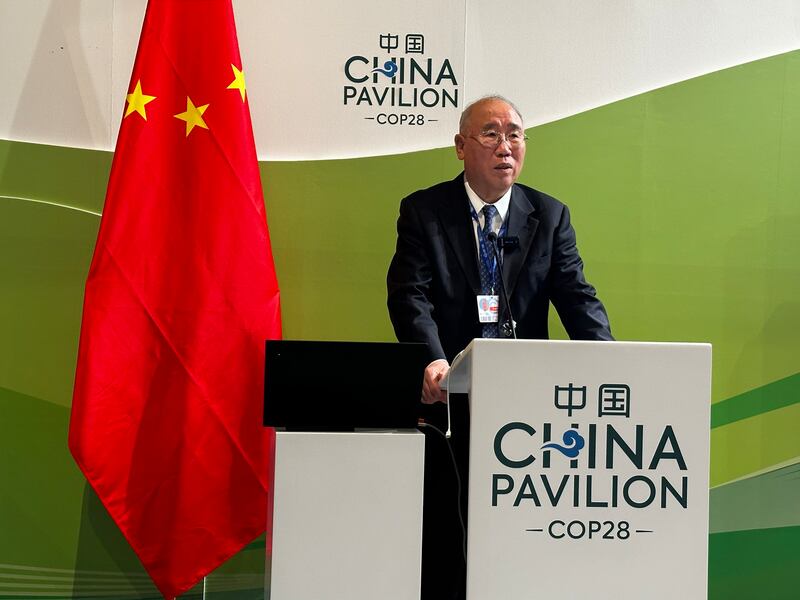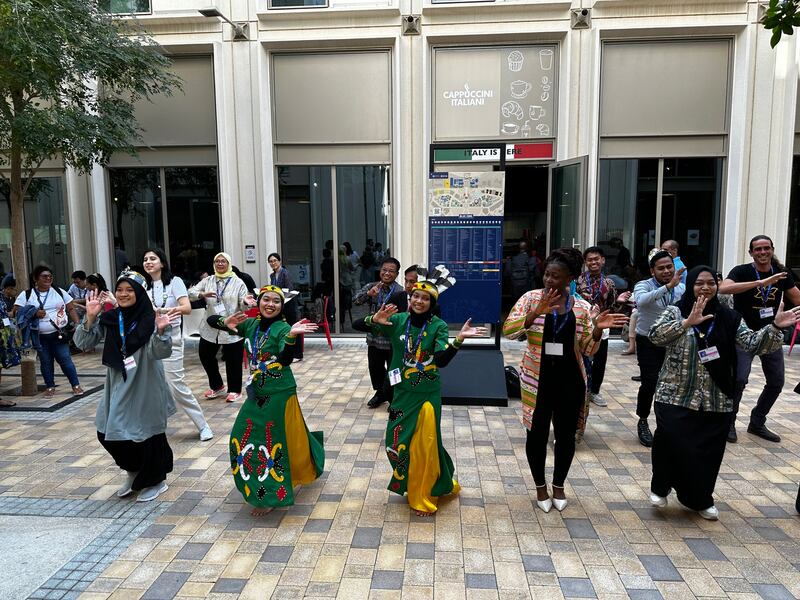If there is one thing that Sultan Al Jaber, the head of Abu Dhabi National Oil Company, wants at the COP28 climate summit, which he is presiding over, it is a deal on phasing out fossil fuel.
It would be historic.
“There is overwhelming consensus that phasing out fossil fuels and scaling up renewable energy is absolutely necessary,” Jaber said on Dec. 10, after meeting with negotiators from 198 countries.
However, as talks enter the last 24 hours, the prospect of resolving key discussion points on some pressing climate issues grows increasingly contentious, with the head of the summit in Dubai urging “to shift gears… to deliver.”
If past COP meetings are any indicator - eight of the last ten have run over by at least 24 hours – the initially planned Tuesday morning deadline for consensus is unlikely.
“Am I satisfied with the speed and the pace? The answer is no,” Jaber told reporters, seemingly to pressure delegates from 198 countries to speed up the process.
“Now, the time has come for all parties to constructively engage and to come to me with that language. I want everyone to show flexibility, to act with urgency, and to find the common ground.”

Currently, the main point of contention is the inclusion of ending fossil fuel in the final text of the summit document.
Fossil fuels, such as coal, oil, and natural gas, have long powered the world. Still, they emit harmful pollutants that contribute to global warming and intensify extreme weather events, as well as contaminate the air with harmful toxins.
This year, global carbon dioxide emissions from fossil fuels are expected to hit a record high of 36.8 billion metric tons by the end of 2023, marking a 1.1% increase compared to 2022, according to the annual Global Carbon Budget report released on Dec. 5.
“Unfortunately, China and India have had a significant increase in emissions,” said Pierre Friedlingstein at the University of Exeter in the United Kingdom.
India and China rank as the first and third-largest emitters globally. Emissions from the rest of the world are expected to decrease slightly.
First time fossil fuel and the lobby is terrified
During COP26 in Glasgow, a deal to phase down unabated coal was agreed upon at the climax, while the mention of fossil fuel was removed due to objections from countries like China and India in the last COP in Egypt.
“This is the first-ever presidency that has called on all parties to come forward with common ground and consensus on fossil fuel,” Jaber said. “Failure or lack of progress or watering down my ambition is not an option.”
To make it a success, Jaber even convened a majlis, a traditional Arabian elders’ conference where participants sit in a circle and speak their mind. It was open to observers.
Over 120 countries have indicated their willingness to endorse a fossil fuel phase-out.
The current draft text offers five versions, varying from phasing out fossil fuels as per scientific recommendations to a phased reduction if emissions are effectively captured and mitigated, and even avoiding any specific language due to opposition from some countries.

A veteran climate activist from Malaysia said the momentum on the “fossil fuel phase out” is still powerful.
“The fossil fuel sector lobby, the third largest delegation at COP28, is feeling the heat. They are in panic mode,” Nithi Nesadurai, regional director for Climate Action Network in Southeast Asia, told Radio Free Asia.
Reuters reported over the weekend that Saudi-dominated OPEC asked member countries to "reject any test or formula that targets energy, i.e., fossil fuels, rather than emissions."
“So, there will be efforts to dilute the language and either refer to ‘fossil fuel phase down’ or ‘phase-out of unabated fossil fuels,’ which will give a loophole to continue to extract oil and gas while giving an excuse to manage the emissions issue with unproven technologies, like carbon capture and storage,” Nithi said.
In a rare move, China speaks on fossil fuel
At the meeting of the negotiating leaders, a Chinese negotiator said that there are two groups in the race.
“The developed countries need to run faster… We didn’t come out of the gate at the same time. They need to help the second group of countries, the developing countries,” the delegate said, adding that developed countries should provide “technology and finance.”
China is the world’s biggest emitter and the second-largest economy. Lately, it has deployed renewable energy faster than any other country globally, but it is also highly dependent on coal.
On Saturday, Beijing’s veteran climate envoy, Xie Zhenhua, held extensive talks with John Kerry, US counterpart, in the Chinese pavilion.
Later, Xie told reporters that he wanted to link the decline of fossil fuels to the rise in renewables.
“I have participated in these climate negotiations for 16 years. The hardest meeting is this year’s. There are so many issues to settle,” he said, highlighting numerous unresolved issues and stressing that the Dubai summit’s success hinged on reaching a consensus regarding the future of fossil fuels.

Xie was careful not to be explicit on whether China supported or opposed a fossil fuel phase-out, just saying they were trying to find a compromise.
“We had this language which said that both China and the US will massively promote renewable energy deployment and use it to gradually and orderly substitute oil, gas, and coal power generation so that we can reduce greenhouse gas emissions,” Xie said, referring to a joint statement made with Kerry at a November meeting in Sunnylands, California.
“I’ve also heard another option for the language, which is to gradually reduce the share of fossil energy in the global energy mix,” he added.
“I think we will all work together to find a language that accommodates the needs of all parties and reflects the big trends of transition and innovation.”
ASEAN states don’t articulate
Climate Action Network’s Nithi, who has been attending COP since 2000, said ASEAN states have always been mum about their stance, though most support some kind of fossil fuel phase out this time.
“They come in, they sit under the radar, they play a shallow profile role. And they don’t articulate very strongly on any position. But they stand behind G77 and China,” said Nithi.
“There is no ASEAN negotiating bloc here at the COPs,” he said, adding that if they came as a bloc, they could express their views within the G77 and China and articulate a strong position.
“They don’t come to COP to play a very proactive role. If there’s one country here which gets more attention than others, it is Indonesia because of the size and what they do.”

For the third year in a row, there is no official delegation from Myanmar, which means they were not part of any formal negotiation in Dubai.
After the February 2021 coup, the junta’s delegation was rejected at COP26 Glasgow. It was not nominated last year or this, but an alliance of indigenous people was able to participate in both.
According to Germanwatch’s Global Climate Risk Index 2021, Myanmar was the second-most affected country from 2000 to 2019.
President Joko “Jokowi” Widodo was the only ASEAN leader to speak at the leader’s conference.
The Philippines, the sole ASEAN nation without a net-zero commitment, lost its chance to be represented at COP in 2015 when President Ferdinand Marcos, Jr canceled his Dubai trip to address the Red Sea hostage crisis involving Filipino seafarers.
Brunei, Cambodia, and Laos have no pavilion, while the rest host several daily events, including music and dance.
Edited by Taejun Kang and Elaine Chan.
